

EdTech News. Early childhood Online courses and classes (5) Open early childhood courses: How do they match up to MOOCs? Www.newamerica.net/sites/newamerica.net/files/policydocs/DigitalArchitecture-20140326.pdf. What Parents and Care Providers Need to Know When Choosing Tech For Young Children. Photo/ Kyle Lichtenwald Experts in media and young children agree; how the youngest children use technology—ideally, with caregivers and with an eye on their learning and development—is more important than how old they are when they start.
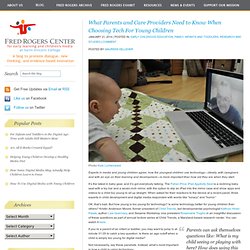
It’s the latest in baby gear, and it’s got everybody talking. The Fisher-Price iPad Apptivity Seat is a reclining baby seat with a toy bar and a seven-inch mirror, with the option to slip an iPad into the mirror case and show apps and videos to a child too young to sit up straight. Ten Questions for Educators to Ask When Using Technology with Young Children. Do technology tools and interactive media like iPads, cameras, or e-readers, belong in the early childhood classroom?
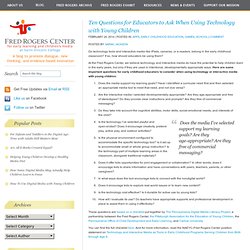
If so, how should educators be using them? At the Fred Rogers Center, we believe technology and interactive media do have the potential to help children learn in the early years, but only if they are used in intentional, developmentally appropriate ways. Www.fredrogerscenter.org/media/resources/Tech_Integration_Checklist_-_Final.pdf. Contrary to Claims, Not All Media Is Bad For Kids Under 12. Photo/Marcus Kwan It's been quite a week in the children's media world.
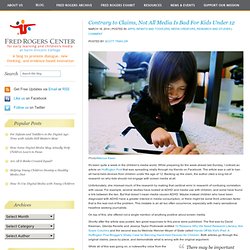
While preparing for the week ahead last Sunday, I noticed an article on Huffington Post that was spreading virally through my friends on Facebook. The article was a call to ban all hand-held devices from children under the age of 12. Backing up the claim, the author cited a long list of research on why kids should not engage with screen media at all. Technology that Supports Early Learning – Three Examples. Digital storytelling for dual language learners; e-books about empathy; deep diving on a virtual Titanic; and more innovative uses of technology for early learning.
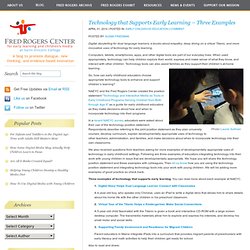
Computers, tablets, smartphones, apps, and other digital tools are part of our everyday lives. When used appropriately, technology can help children explore their world, express and make sense of what they know, and interact with other children. Technology tools can also assist families as they support their children’s at-home learning. Photo/ Laurie Sullivan So, how can early childhood educators choose appropriate technology tools to enhance and support children’s learning? Do the Building Blocks of Computer Programming Begin in Preschool? Photo/ Allie Pasquier These are exciting times in the field of early childhood education.
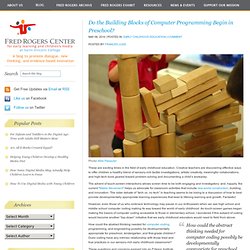
Creative teachers are discovering effective ways to offer children a healthy blend of sensory-rich tactile investigations, artistic creativity, meaningful collaborations, and high-tech tools geared toward problem solving and documenting a child’s work/play. The advent of touch-screen interactions allows screen time to be both engaging and investigatory; and, happily, the current “Maker Movement” helps us advocate for classroom activities that include real-world construction, building, and innovation.
The older debate of “tech vs. no tech” in teaching seems to be losing to a discussion of how to best provide developmentally appropriate learning experiences that lead to lifelong learning and growth. Do the Building Blocks of Computer Programming Begin in Preschool? Digital Media Literacy for Early Childhood Educators. How do we support early childhood teacher preparation so it keeps pace with technology?
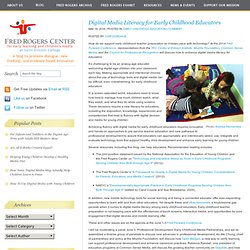
At the 2014 Fred Forward Conference, representatives from the TEC Center at Erikson Institute, Mozilla Foundation, Common Sense Media, and the Council for Professional Recognition will discuss how to enhance digital media literacy for educators. Get popular free downloadable tools to use in the classroom. Mccormickcenter.nl.edu/wp-content/uploads/2013/03/dlf11.pdf. What is digital literacy? Digital literacy is the topic that made the ETMOOC learning space so irresistible to me… I think as educators we spout off about wanting our students to be digitally literate, but not many of us (myself included) have a firm grasp about what that actually means, and quite a number of us are still attempting to become digitally literate ourselves.
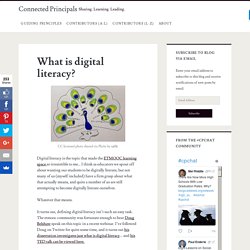
Whatever that means. It turns out, defining digital literacy isn’t such an easy task. The etmooc community was fortunate enough to hear Doug Belshaw speak on this topic in a recent webinar. Digital by design: delivering better government services through information and technology - public consultation draft. A guide to implementing cloud services. Online Learning: More Than Just a MOOC « TechKNOW Tools. As a life-long learner, I have appreciated engaging and interacting with a wide variety of educators in a few Massively Open Online Courses (MOOCs).
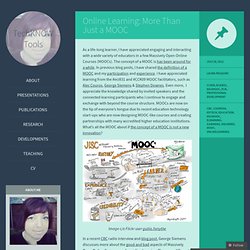
The concept of a MOOC is has been around for a while. In previous blog posts, I have shared the definition of a MOOC and my participation and experience. I have appreciated learning from the #eci831 and #CCK09 MOOC facilitators, such as Alec Couros, George Siemens & Stephen Downes. Personal Learning Environments and the revolution of Vygotsky’s Zone of Proximal Development. Developmental psychologist Lev Vygotsky defined what the person or a student can do — or the problems they can solve — as three different stages: What a student can do on their own, working independently or without anyone’s help.What the student can do with the help of someone.What it is beyond the student’s reach even if helped by someone else.
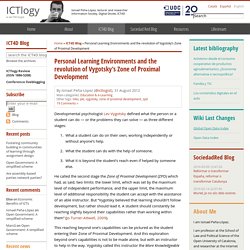
He called the second stage the Zone of Proximal Development (ZPD) which had, as said, two limits: the lower limit, which was set by the maximum level of independent performance, and the upper limit, the maximum level of additional responsibility the student can accept with the assistance of an able instructor. But Vygotsky believed that learning shouldn’t follow development, but rather should lead it. Google.
Inovating Pedagogy. Special Needs Apps. iPad/iPod Resources. Education. See on Scoop.it – tech | design | education Get a bird’s-eye, real-time view of student activity across Docs, Sites, Blogger, Picasa, Gmail and Google+; plus configure class Calendars.
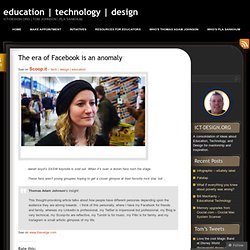
Improve student outcomesIncrease online safetyIncrease ease of use and adoption Thomas Adam Johnson‘s insight: The teacher dashboard is intuitive and fast. Social Media Networking. Creating a social media policy for your not-for-profit. A good social media campaign or engagement strategy can help your organisation fulfill its mission. There are many examples of not-for-profits using these tools successfully for everything from fundraising and volunteer recruitment to building awareness on sites such as Facebook, Twitter, and LinkedIn. But there are also examples of organisations that have encountered pitfalls along the way to an effective social media presence.
A good social media campaign or engagement strategy can help your organisation fulfill its mission. Social Media Moderation Guide from the Victorian Government's Department of Justice. Teaching Online Courses – 60 Great Resources. I received an inquiry about resources that would help instructors who are about to move into teaching online courses. It made me immediately think back to my first experience with an online session. It was the first ever public session for Placeware - a virtual meeting software company that was much later acquired by Microsoft and became Microsoft Live Meeting.
Social media code of conduct. PolicyTool for Social Media. Content Curation. Early Childhood iPad Apps. Mobile Learning - Early Childhood Education - Resources by topic (subject guides) at Australian Catholic University. Here’s how a former kindergarten teacher approaches app development - iPhone app article - Brad Spirrison. There is no prototypical background for app developers. The beauty of working in the app world is that it is so new, you find individuals from all walks of life creating applications we could not have fathomed just four short years ago.
After spending more than 25 years helping to develop young minds as a kindergarten teacher in Chicago, Francis Judd switched gears to become an app developer. Her company, Mrs. Judd’s Games (which is a unit of KBooM! Games), develops early-stage education games. In many ways, Judd’s mission as an educator hasn’t changed all that much.
“I realized,” she explains, “that I had not so much retired from the classroom as I had expanded the scope of my classroom.” Download the Appolicious Android app. Our apps for Special Education list is HERE!!! Ipad childrens education. iPad Family has reviewed HUNDREDS of iPad Education Apps for children. NOT ALL OF THEM MAKE IT TO THIS SITE. We're only happy to shre the best, highest quality educational Apps. When evaluating an app, we consider it's educational value. iPad apps. Wikiforpersonalinquiry - iPad Apps for Early childhood. Keslie's TopicWatching and Wondering: How Did I Choose This Topic? I became interested in this topic after watching a two year old effectively use and interact with apps on an iPad.
The child was able to turn on the ipad, scroll through the pages, find her personal folder, and choose a game to play. I was amazed by this process and was very impressed with how she was able to independently use the iPad. As I watched her interact with the apps, I realized how educational the apps are in helping with cognitive, linguistic, and motor skills development. These apps require children to count, talk, write, manipulate items on a screen, color, read, sound out words, and so much more! Early Childhood Ipad Apps. Early Childhood Education and the iPad. E-learning definition. Building an inclusive definition of e-learning: an approach to the conceptual framework. E-learning is part of the new dynamic that characterises educational systems at the start of the 21st century. Like society, the concept of e-learning is subject to constant change.